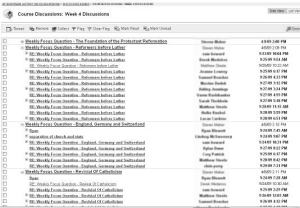Enough! I’ve had it, no more Mr. Nice Guy.
There’s been a spate of student complaints about “too much tech” because they have to remember usernames and passwords for their email and the school’s Moodle site. In some classes they even have to (gasp!), go to other sites like Turnitin. How can we expect them to do all this?
Unfortunately, teachers and parents who don’t have enough experience with technology themselves may

think these protests are valid. They can quickly dismiss student complaints about “too much homework”, but somehow they think student protests about technology are legitimate. Maybe it’s because they agree. Setting up accounts, logging into websites and remembering passwords seems like to much trouble to them.
Teachers with technology experience have no trouble for seeing these complaints for what they are, simple student whining. Students complaining about “tech-fatigue” are not any different from students who try to convince teachers that they shouldn’t do any work on Friday because “it’s almost the weekend!!” A teacher told me that he quashed these complaints by showing students that on-line banking, medical insurance, paying taxes, renewing driver’s licenses, reserving flights, registering for college classes are all on different systems that they will have to learn and master quickly.
Come on folks! By forcing students to navigate new environments we are giving them essential experience to survive in the real world. If they come back with the ‘ol “but you are teaching Social Studies”, hit ’em back with “you can’t learn Social Studies if you are illiterate”.
And don’t think for a second it’s only students experiencing this misunderstanding. I created a professional network on Ning for social studies supervisors that many of my colleagues complimented. But those compliments were quickly followed by “maybe we should phase this in slowly”. Translation: “Let’s keep the listserve open”. The jump from the listserve to the professional network was apparently too much to ask. These educators are familiar with email and they know how it works so it was claimed that they would need training to create accounts and navigate the site. After six months, thirty member registrations, and no more than five posts made by people other than me, the network is a ghost town.
Two years ago, I readily understood the discomfort that accompanies the first jump into this new world. Although I still sympathize with those people trying to understand these new environments, I’ve lost my patience with those who claim that it’s too difficult to manage a couple accounts and navigate web sites.
This anger and frustration fueled an analogy that popped into my head last week and I’ve repeated it in at least a half-dozen conversations. A person in 1990 who could not write a letter, address the envelope and

mail it using the postal service would be considered functionally illiterate. A person in 2008 who cannot create an account or remember a username and password to access a website is also functionally illiterate.
You might still be able to get by in 2008 without these basic technology skills, you might even think you can become president. But the clock is running, and it’s running fast. If you are an educator, it is your responsibility to make sure your students can survive in the real world that they will live in, not the one you grew up in.
Imagine if mail service was invented, would these people complain about the stamps? Where do I buy these things? Where do we stick them? Why do I always have to put in a return address? Why do I have to remember the zip code?
Enough!
 web site with which users manipulate data in lists gives a user the opportunity to select every item on the list at once. I know many of the people reading this public letter (even if I can count their total on one hand) are used to seeing a tall tree of checkboxes with a helpful little “select all” button at the bottom. “Select All” has been around as long as I can remember.
web site with which users manipulate data in lists gives a user the opportunity to select every item on the list at once. I know many of the people reading this public letter (even if I can count their total on one hand) are used to seeing a tall tree of checkboxes with a helpful little “select all” button at the bottom. “Select All” has been around as long as I can remember.
